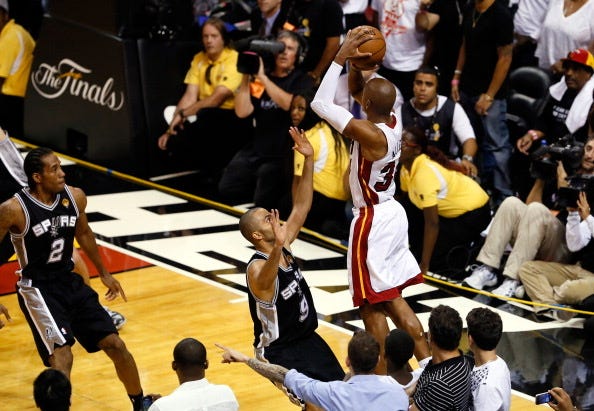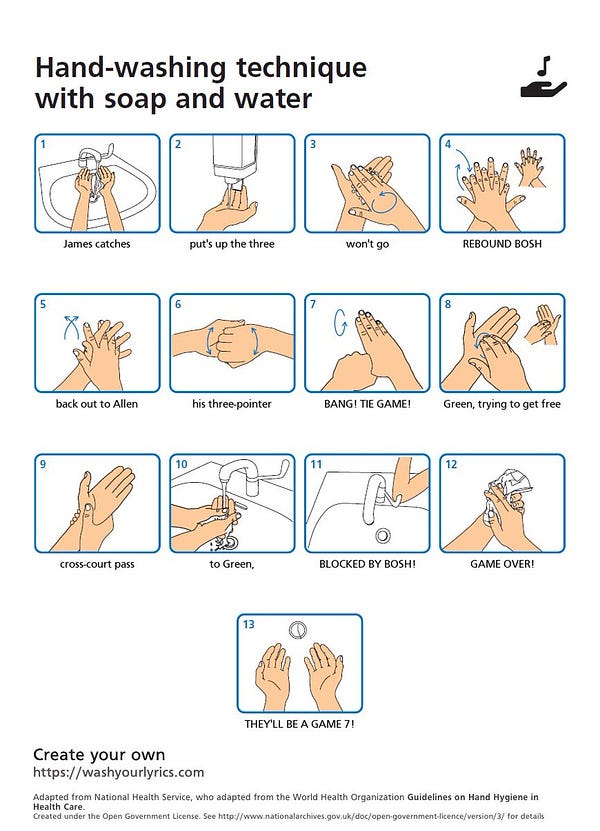Welcome back to The Last Chip, the newsletter where I share stories and lessons from behind the scenes of The Big Three’s last championship season. This is a free post, but if you want access to every issue of The Last Chip—and if you want the chance to chat with me directly in the comments—you should become a paid subscriber.
All proceeds from this month will be donated to Color of Change, a leading organization in the Black Lives Matter movement, and all it costs is five bucks, so sign up now:
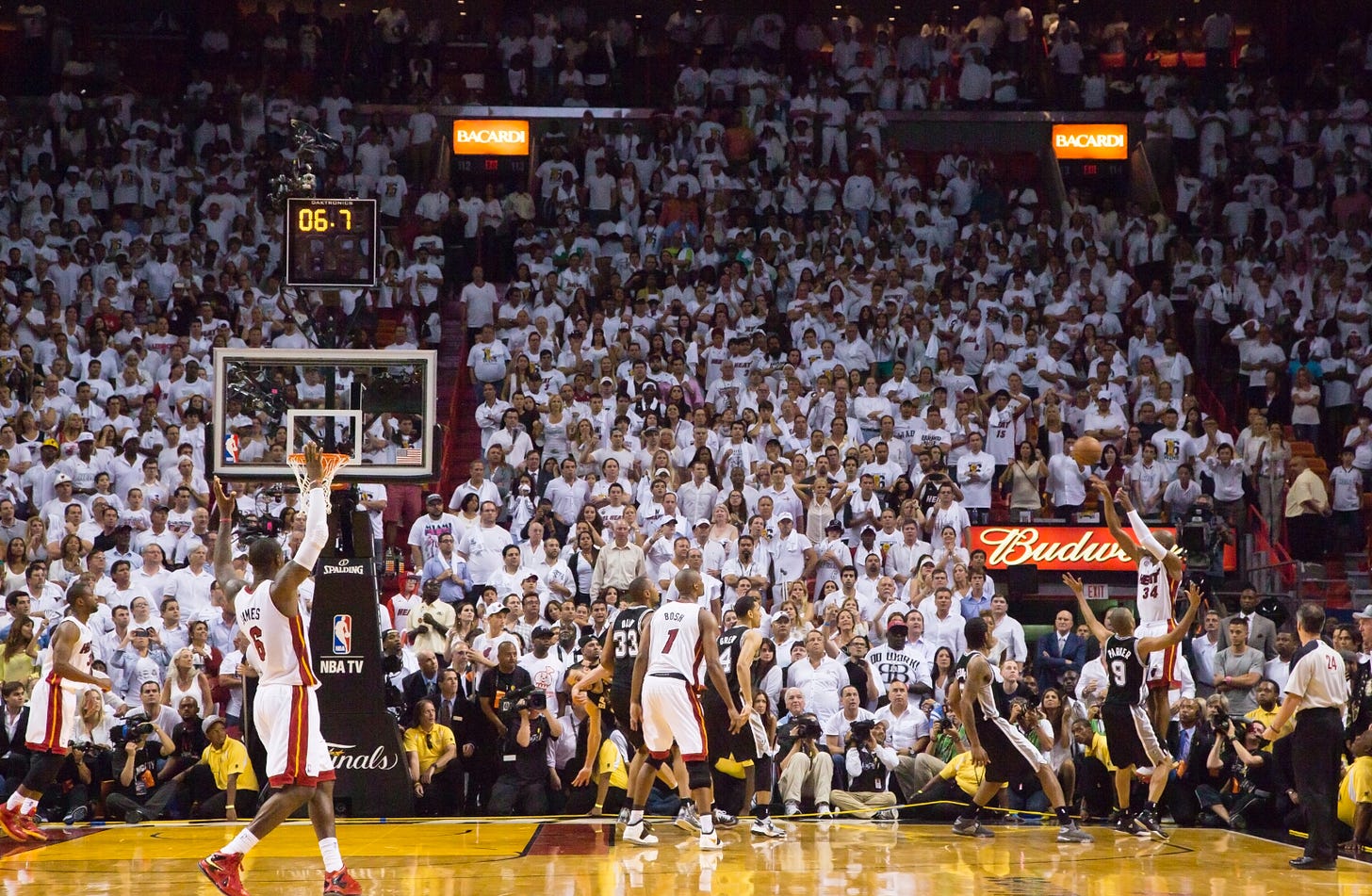
They say you spend somewhere around 200,000 hours sleeping in your life. 30,000 eating. And I’ve spent quite a few playing professional basketball. But the stat I’d really like to know is how many minutes I’ve spent talking about The Rebound. And The Shot that came after it—even though I didn’t take it.
For those of you whose minds didn’t immediately go there when you saw “Game Six” in the headline, I’m talking about the play that sent us to overtime against the Spurs. The play that birthed a million memes.
It started with a missed shot, followed by a board I ripped out of the air—and ended with Ray Allen sinking a corner three that sent us to overtime with five seconds on the clock. Here, just watch it.
Or watch the re-enactments of it posted to TikTok:
This is the moment in my career that fans ask me about the most. And I get it. That game was legendary. But I’ve also told the story of how it went down more times than I could count. Like: If you’re curious about the play-by-play, you can read this interview I did with Bill Simmons. And if you want to hear my take on why that game meant so much to me, you can watch my retirement speech. I even opened up about my mindset during Game Six in the very first issue of The Last Chip.
So today, I didn’t want to tell you my side of the story again. Instead, I wanted to have a conversation with my buddy Ray Allen—Jesus Shuttlesworth himself—about everything that led us to that moment. Ray is one of the smartest, most insightful guys I’ve ever known. He was a hell of a teammate. And I knew he’d bring hilarious takes, and meaningful life lessons, to the newsletter if I got him started talking about Game Six.
Well, as always with Ray, he delivered. And I hope you get as much out of this conversation as I did.
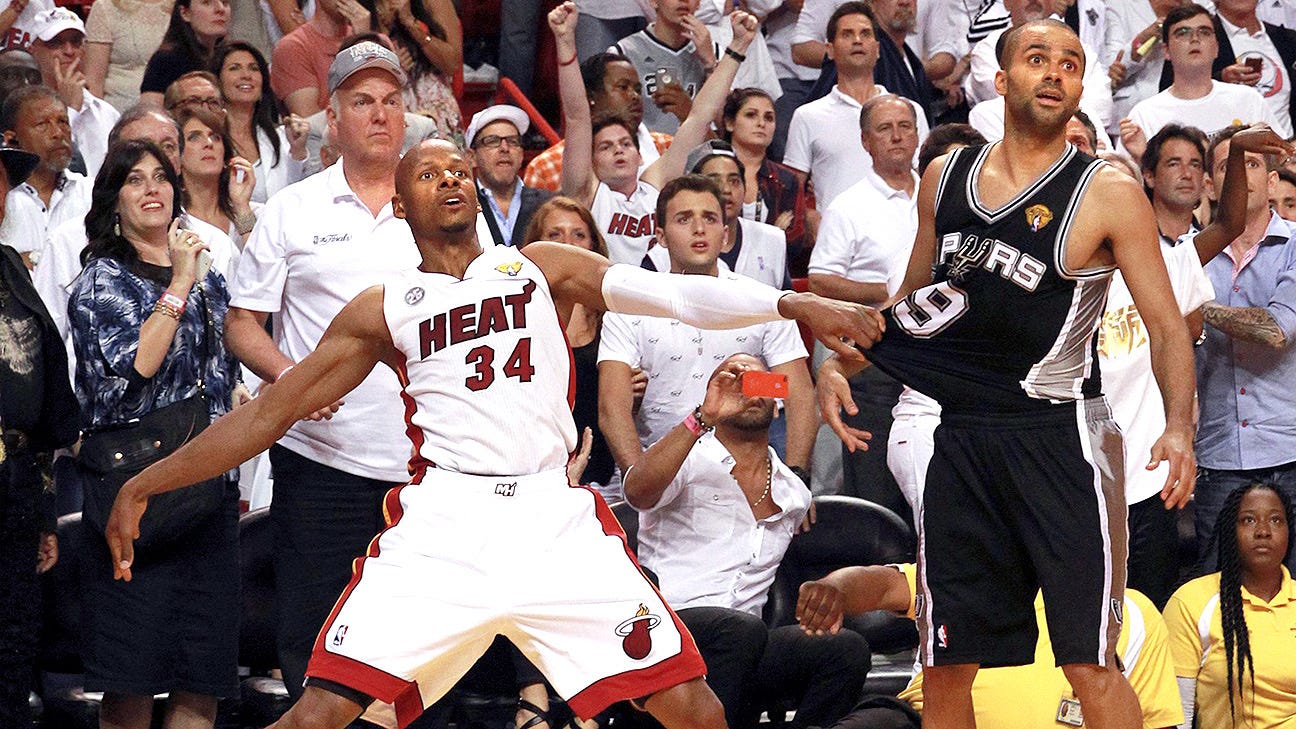
CB: In interviews in the past, you’ve called the shot the “heaviest moment” you’ve ever experienced. Why do you think the stakes felt so high for us? Were you thinking about what happened if it didn’t drop?
Ray: If I don’t make that shot, it’s pretty easy to say that we don’t win the championship—and things happen differently moving forward. It changes a lot about history.
I was going to be a free agent. I had player options; LeBron had player options. If he decides to go somewhere else, it’s a house of cards—everything crumbles. But we didn’t worry about that at the time. I think we were the oldest team in the league, so we didn’t really think about free agency. That’s what young players think about, because they’re worried about finances, worried about their future. We knew the time was now, and we were built to win. But we also knew that sometimes you get beat by a better team, and you tip your hat and move forward.
CB: And we knew this couldn’t be one of those times! To this day, I get chills replaying the shot in my head. It drives me crazy—any small detail could’ve thrown the whole thing off.
Ray: By the time I got to Miami, I was driven by winning more than ever. There was so much hate from everybody that didn’t want the Heat to win. Half of Massachusetts—no, all of Massachusetts—was rooting against me. So we needed to win that game.
You know, I was golfing with Wally Szczerbiak last week. I said, “Can you believe we made it through our careers unscathed?” At first, he didn’t understand what I meant. So I explained I was talking about the fact that when we run into basketball fans anywhere, they say: “Hey, you guys were great,” and nobody’s whispering behind your back when you walk away: He’s the guy that missed a free throw, or, he’s the guy that didn’t know how much time was on the clock at the end of the game.
In the course of sports history, you see people that end up being famous because they cost their team the championship. We made it through unscathed—and we had glory.
I still wonder why you passed me the ball, though.
CB: Hah, I never even thought about me doing anything else. It was all reflexes.
When LeBron took that deep three, I followed it my whole way to the basket. One of the earliest and most helpful pieces of advice I ever got on rebounding was, “All you have to do is get there before the ball does.” And as I played more and got better, I became better at watching the flight of the ball, trying to drill it in to the point that it’s automatic. Sometimes, watching can be dangerous—you can take an elbow to the face pretty easily. But not this time; no one was boxing me out that play. So I watched the ball, figured out where it was going, ran there, and grabbed it.
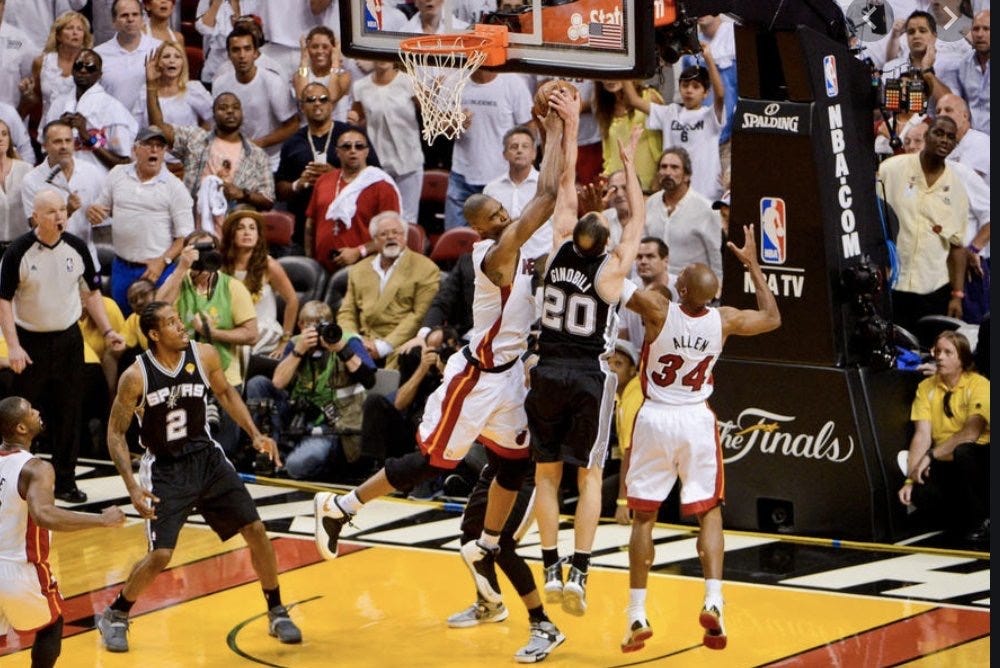
I know there were other things I could’ve done next. We’ve seen plenty of people dribble out to the arc and get tangled up, lose possession. So I knew I couldn’t put the ball down. And I wasn’t in much of an offensive rhythm that series anyway.
But then I swear I heard someone yell my name, loud as hell, from the corner. I thought it was you! You’ve told me it wasn’t. But honestly, I wasn’t thinking. I passed it to you as a reflex, so I don’t even know if I can take credit for making the decision, because it’s not really a decision.
Ray: Brother, you get the credit.
CB: My pass was a reflex, but I have to believe your shot kind of was, too. How do you practice something like that?
Ray: I always say that if you want to become a better basketball player, you have to become a better person.
One day when I was 24, I was on the golf course. It was an easy hundred-yard shot, and there was nothing in the way but the green. And I thought, I don’t know where this is going because I’ve never practiced this shot. And I expect to have a positive result. Then I thought: I play basketball the same way. Because when you’re young, you just go out there and do it, and figure it out. I was thinking: I don’t practice everything I do on the basketball court. I just go on the floor and do things because I can.
So when I got back to the court that fall, I said: Work on everything that you do in a game, so you’re never in the position you were in on that golf course.
Because one of the beautiful things about basketball is the simple fact that the court doesn’t change, the hoop doesn’t change—the only thing that differs is your opponent. We have a tendency to make it so much more grandiose or intimidating than it actually is. It’s still 94 feet and 10-foot baskets. Nothing changes.
So I had to take control by working everything—not to the point where I wanted to succeed so bad, but to the point where I couldn’t fail.
After a while, when I looked at the three-point line I knew how far I was from the sidelines, the baselines, half court, the top of the key—because I’d run those steps so many times. I could count how many steps it took me to get from one spot to the next. I could backpedal and know exactly where I am. You feel where the basket is in relation to your body. That’s just from repetition, doing the same thing over and over again. And it paid off in Game Six.
CB: I feel like repetition is also how we built chemistry as a team. I remember being in practice, thinking, Okay, Ray’s still in the gym. D’s still in the gym. Bron’s still in the gym. They’re still getting their shots up, so I better be sure I’m getting my work in. And it was more than just basketball. There were so many dinners, family gathering, team functions, obligations to the community, and it helps to be good friends with the people you work with. Did you have to make any changes to what you practiced when we started playing together?
Ray: I think the only adjustment for me was the way the team was run. I wasn’t starting; the ball didn’t have to come through me. It was more random.
The sacrifices that Shane made, that UD made, Juwan—you saw the sacrifices that everybody made to be a part of the team and help win. So it was easy to swallow that pill.
But starter minutes are so different from bench minutes. Bench minutes, you come in, and you come back in later in the quarter depending on the need. But starters go out and come back in a couple of times. The more you’re in a game, the more you catch your rhythm, the more you’re part of the flow. As a person coming off the bench, you have to find your flow early—and if you don’t have it, you get taken out of the game.
So I couldn’t really waste the time trying to feel the atmosphere or settle into the game.
I don’t know if a lot of people know this, but during the playoffs, I was going to the practice courts in the American Airlines Arena and shooting in the first quarter. When you guys were playing, I was shooting and getting ready. I wasn’t even watching the game—I didn’t want to be sitting on the bench, getting ready to go into the game cold. Sometimes I’d come into the game with two or three minutes to go in the first quarter, and a lot had happened. I needed to have a lather to go in the game. So I thought, let me go and create my own lather.
CB: Having a player like you come into the game is intense to navigate on both sides. People think it’s a simple thing to have Ray Allen suddenly clock in. But what if I’m like, I’m gonna shoot this one, and the first thing you say is, “Hey, swing it to me, man. Let’s get some movement,” because you’re trying to get into the game. You and I had those conversations—plenty of uncomfortable ones, plenty of comfortable ones.
But the fact that you were able to come and talk to me about it, and the fact that I was able to come and talk to you about other things, that builds the chemistry more than just talking to each other on the court in the heat of the moment. Or if we were having problems and I grabbed that board, I could have flinched for a minute and not passed right away—and then maybe the shot doesn’t go in. Building trust off the court makes things work on the court.
But you made the shot, because of course you did. And even though we still had to play Game Seven, do you think we locked down the series with that bucket?
Ray: It’s fascinating—with the Bubble, these environments that we’re talking about won’t present themselves, because there’s no homecourt advantage. But the reason that momentum made it over for San Antonio after that was that we were in Miami for Game Six. They were so excited about winning the championship, and then the air was let out of their sails, because they couldn’t hold on to anything. You’re trying to figure out a way to stop the bleeding, but you can’t, because now our fans are rowdy.
And when you lose after you think you’re gonna win, that’s tough to come back from. CB, we never talked about this, but I guarantee you the Spurs didn’t book their hotel rooms for enough nights to get them through Game 7. Teams do that sometimes as a way to pump themselves up: “Let’s check out of our hotels before Game Six because there’s not going to be a Game Seven.”
Things like that can be confidence boosters, or they can be high-blowers: You make a gamble, and it can bite you in the butt. I’m not saying that’s what they did, but coaches have done that in the past, and sometimes it works out and you’re grateful for it, and other times, it sends you in the wrong direction.
And then, going into Game Seven, you’re wounded, because you’re still thinking: We were supposed to win that game, we were supposed to check out of our hotels, win that championship, and be home celebrating. That’s what I call—I’m gonna coin it right now—The Second Free-Throw Theory. If you miss the first free throw, you always miss the second free throw; you’re so focused on having missed the first that you miss the second.
CB: Obviously, you didn’t miss a lot of free throws. And that brings me back to where we started this conversation—talking about how hard you practiced. For anyone reading this who’s grinding at whatever they do: How do you know when you’ve put the work in?
Ray: There’s no point in my career where I sat back and said, Man. I’m really good. I never thought that, because I always felt like I could get better. The moment you think you’re really good is the moment you stop working.
I always use this example: we played Toronto a little before you got there, on back-to-back nights: a Monday and a Tuesday. I had forty on the Monday. The next day we didn’t have shootarounds, but I was in the gym, shooting by myself.
The Toronto coach comes in, looks at me, and says, “What are you doing here? You killed us last night. You’re the last guy who should be shooting.” I said, “If I want to do it again, I have to put the same work in that I put in yesterday.”
You can’t think that you don’t have to work anymore because you’ve put out a successful effort or won something. The minute that you do that is the minute you regress, and end up putting yourself in a situation where you can’t make a shot.
CB: Do you find yourself thinking more in terms of lessons these days? I definitely do. I think that’s cause we’re the old guys now—although if it were up to me, I’d be an old guy in the NBA— but in hindsight, what wisdom do you take into your post-basketball career?
Ray: The thing I learned from watching other guys retire is that just because you’re a great NBA player doesn’t mean that you have carte blanche in your next life. It doesn’t mean you’re supposed to get a GM job or you’re supposed to be offered fifty million things. I’ve seen guys think that, because they were Hall of Fame players, they’d be offered positions in organizations. You have to work for that. I tell myself that if I do decide to take on another endeavor, I’m going to work at it as much as I’ve worked on playing basketball.You can talk about greatness on the floor, but greatness is just consistency, when you do it over and over again.
I go back to those long nights I spent on the courts, or getting up early to work on something, and I know that it was for something down the line. All the shots I’ve hit to win games—Game Six is the culmination of all of them. If you put in the work, the ball’s always gonna come to you, and you have to be ready to answer the bell.
CB: And that’s a direct result of the sacrifices you make.
Ray: Sometimes, I think about those sacrifices. And I realize we made them because we knew they would have a lasting effect on our children, our community, forever. And to have regrets is one of the worst emotions to have—not only in sports, but in life. So if you can deal with the hard work—putting off parties and hanging out with friends for the time being—you can catch up with that stuff later in life.
Now, we can do a lot of the things that we want to do. But we knew then, and we know now, that we gave everything we had at the moment because we were going to be sitting somewhere having this conversation.
